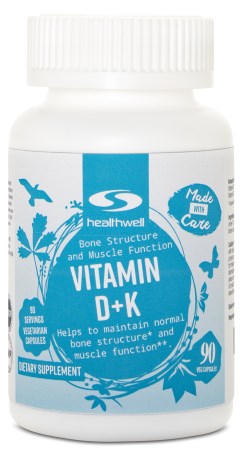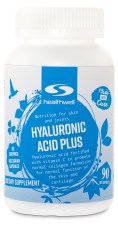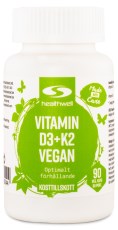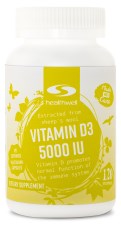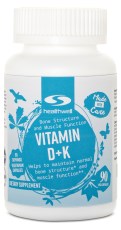
Vitamin D+K
- Muscle function
- Immune system
- Product description
- Nutritional content
For bone structure and muscle function
In Vitamin D+K, you’ll find the two vitamins D and K. Vitamin D contributes to the absorption and utilisation of calcium. Calcium, in turn, is a mineral of great importance for the preservation of a normal bone structure. Vitamin K also has this function, as the vitamin is vital to normal mineralisation of bone structure. In addition, vitamin D has a role in the normal function of the immune system and muscles, while vitamin K contributes to blood coagulation.
- Vitamin D contributes to calcium absorption
- For the preservation of normal bone structure
- Muscle function, immune system, and blood coagulation
- Vegetable tablets of cellulose and coconut oil
Healthwell's dietary supplement Vitamin D+K consists of tablets composed using the vegetable ingredients cellulose and coconut oil. The tablets are produced by gentle cold pressing, so that the included vitamins are not damaged.
What is vitamin D good for?
Vitamin D has many important functions in the body, including interacting with calcium in the blood. Calcium is the mineral the body has most of, and about 99% of it is found in bones and teeth. The skeleton also acts as a calcium reserve to ensure that there is always calcium that the body can use for, among other things, the normal function of the muscles and nerves. Vitamin D helps regulate the uptake and turnover of calcium and ensures that the excess is stored in the skeleton. Calcium is found mainly in foods such as dairy products, mussels and kale. Vitamin D is also important for the normal functioning of the immune system.
what is vitamin K good for?
Vitamin K contributes to the blood's ability to coagulate. Vitamin K also interacts with calcium and vitamin D in the body by contributing to the maintenance of a normal bone structure and bone density. It is calcium that maintains the bone structure, while vitamin D helps with the absorption of calcium from the diet and vitamin K helps regulate how calcium is used in the body. Vitamin K is found naturally in green leafy vegetables, eggs and liver, and can also be produced to some extent in our intestinal flora. Vitamin K is found in various forms where K1 (phylloquinone) is mainly found in vegetable sources while K2 (menaquinone) is found in animal sources. Good to know is not to combine vitamin K2 supplements in conjunction with blood thinners, unless your doctor has prescribed otherwise. This is because vitamin K2 promotes the blood's ability to coagulate and can therefore impair the effect of blood thinners.
Fat-soluble vitamins
Both vitamins D and K are fat-soluble, which means that they need fat to be absorbed into the body. Therefore, feel free to take Vitamin D+K with a meal. Since vitamin D plays a role in calcium absorption, it may also be a good idea to take the supplement with calcium-rich foods such as milk. If you want, you can also supplement with a calcium supplement, such as Calcium 800, to ensure your calcium intake.
With coconut oil for better absorption
The coconut oil contained in the tablets also helps the body to absorb these vitamins, as they are fat-soluble. In order to improve absorption further, you can take the supplement with food. Since vitamin D plays a role in calcium absorption, it may also be a good idea to take the supplement together with calcium-rich foods such as milk. We therefore recommend taking 1 tablet daily in conjunction with food.



